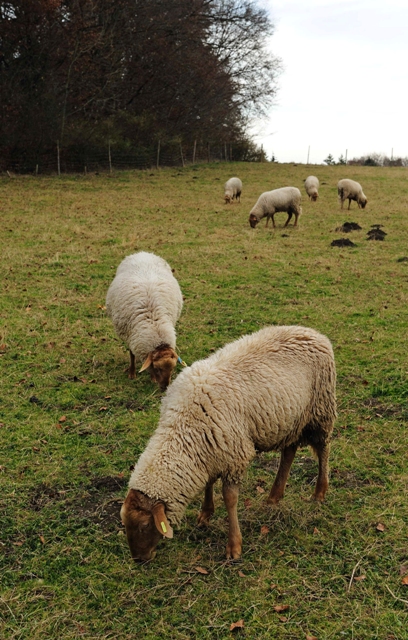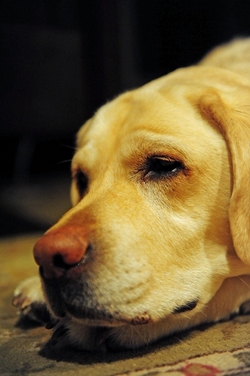Dog Days and Sheep's Cold
 Friday, June 24, 2011 at 16:10
Friday, June 24, 2011 at 16:10 Perhaps it's the long agricultural tradition or maybe the environmental awareness, but the southern Bavarians are still very in touch with nature and weather patterns. I think our parents all remember this type of knowledge, but it's beginning to be lost by our generation and the next ones as our daily lives become more and more removed from the land. Living in Bavaria and Thailand has reminded me of many of the traditions I'd forgotten or never known, as well as taught me new ones. And if there's one thing I've learned here is that if they've bothered to make a German word for something, it means it will happen with regularity!
Despite a couple of glorious hours of warm sun yesterday morning, it's been chilly and rainy here for the past week or two.
Every year, it's pretty similar...Warm weather comes just before Easter, in time to open the beer gardens. It's normal that the temperature varies widely throughout the day - it's often a little chilly in mornings and evenings, even in August. But around the 2nd week of June, it gets downright chilly and nasty. Invariably, it's just a few days after I finally give in and pack away the winter clothes and bring out summer. Luckily this year I planned ahead and left a few things out for the cold times.
 In Bavaria, they call this the Schafskälter, which means Sheep's Cold. The cold snap usually ocurrs soon after the sheep are shorn, leaving them very cold and vulnerable. (apparently the lambs and ewes normally aren't shorn until after the schafskälter, as the cold can be dangerous to them). In the Austrian Alps, this can even bring snow at higher altitudes, and here in Munich hail showers are not uncommon.
In Bavaria, they call this the Schafskälter, which means Sheep's Cold. The cold snap usually ocurrs soon after the sheep are shorn, leaving them very cold and vulnerable. (apparently the lambs and ewes normally aren't shorn until after the schafskälter, as the cold can be dangerous to them). In the Austrian Alps, this can even bring snow at higher altitudes, and here in Munich hail showers are not uncommon.
There is a scientific explanation for this - in Germany and Austria, the land has warmed up, but the northern seas still are quite cold, creating a massive low pressure zone over the area. This brings cold polar air down from the northwest, and reverses the prevailing winds so that it stays here. According to the Bauernregeln.com (roughly similar to a Farmers' Almanac), this early June drop in temperature happens with 89% regularity!
 We do have the Dog Days (Die Hundestage) to look forward to in late July and August. The hottest, driest days of summer, they have been called Dog Days by the Romans, Greeks, and ancient Egyptians. Not because the dogs pant and seek shade, but because they coincided with Sirius (the Dog Star, in the Canis Major constellation) rising at the same time as the sun over the Nile and Tiber rivers. We know today that it's a regular high pressure area that settles in, but the ancients thought that Sirius brought the weather.
We do have the Dog Days (Die Hundestage) to look forward to in late July and August. The hottest, driest days of summer, they have been called Dog Days by the Romans, Greeks, and ancient Egyptians. Not because the dogs pant and seek shade, but because they coincided with Sirius (the Dog Star, in the Canis Major constellation) rising at the same time as the sun over the Nile and Tiber rivers. We know today that it's a regular high pressure area that settles in, but the ancients thought that Sirius brought the weather.
So, while the Hundestage aren't uniquely German, as a good resident of Bavaria, I look forward to spending the hot days under the shade of a beer garden tree, or wading in the Isar!
 Frau A ...
Frau A ...  5 Comments
5 Comments 




Reader Comments (5)
I remember while studying at the Goethe Institue in Prien am Chiemsee there was a weather system referred to as the "Fern" (or something similar). That tended to make people sick. Do you have an idea what that might have been?
I remember while studying at the Goethe Institue in Prien am Chiemsee there was a weather system referred to as the "Fern" (or something similar). That tended to make people sick. Do you have an idea what that might have been?
You're probably thinking about the Föhn: http://en.wikipedia.org/wiki/Föhn
People claim the winds can cause anything from mood wings to full-blown insanity, much like cold drafts or walking barefoot supposedly cause people to catch colds. There is no real evidence for any of this, of course.
Thanks, AS. Exactly it!
I think it's a bit overblown, but it does seem to have some degree of effect. there are days I've felt really just weird or a little lightheaded and later heard everyone say it's the Föhn.
however, many take it very serious...so much that schools have postponed test weeks that are during the Föhn out of fear that students will be unable to properly think and focus.
Just in case somebody is trying to find more information on those German terms:
it should be "Schafskälte" and "Hundstage".
I think they are known throughout Germany not just Bavaria, I am from the north of Germany and my parents used those terms quite a lot. There is another cold spell a bit earlier, usually around May: "die Eisheiligen" (i.e. "die kalte Sophie").